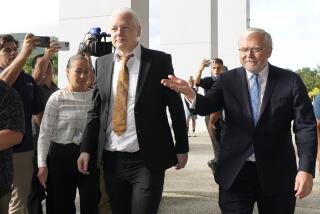After 5 years in Egyptian prison awaiting trial, American sentenced to 15 years, but freedom looms for Egyptian photojournalist
- Share via
Reporting from Cairo — They have both spent over five years in jail for crimes they say they never committed, but there were contrasting fortunes for an Egyptian photojournalist and a U.S. citizen on Saturday as a judge ruled that the photojournalist could go free but the American was sentenced to 15 years in prison.
Photojournalist Mahmoud Abou Zeid, 31, and Egyptian American dual citizen Moustafa Kassem, 53, were both part of a mass trial of 739 defendants, who largely are suspected to be members of the now outlawed Muslim Brotherhood group, and accused of taking part in a sit-in protest that ended in violence in 2013.
For the record:
5:55 p.m. Sept. 8, 2018An earlier version of this story gave an incorrect first name for former Secretary of State Rex Tillerson.
Seventy-five of the defendants, including senior Brotherhood members, were given the death penalty and 47 others, including Mohamed Badie, the head of the Muslim Brotherhood, were sentenced to life in prison.
In a trial that Amnesty International called a “grotesque parody of justice,” 419 of the defendants on trial were tried in absentia and five others died before the verdict was issued.
All the defendants faced the same raft of charges including membership in the Muslim Brotherhood, as well as possession of a weapon, illegal assembly and murder, among other charges. Kassem and Abou Zeid had originally faced the death penalty but learned after the second postponement of the verdict in July that they had been spared that fate.
Cheering could be heard coming out of the defendants box nearly the length of the entire large courtroom in Cairo when several prisoners, including photojournalist Abou Zeid — popularly known as Shawkan — learned that they were one of the 215 prisoners to be sentenced to five years. Since they have already served that amount of time while awaiting trial, it means they can now go free once their release is processed. All, however, will remain under police observation for five years.
Standing a few feet from where a beaming Abou Zeid — who has become an international symbol for the Egyptian state’s crackdown on the press — was waving and giving a thumbs up to the mainly journalists and lawyers in the courtroom, his lawyer Karim Abdelrady said, “I feel happy. It’s not a fair sentence but it’s good because he will be free… that’s what’s important.”
A few minutes later outside the courtroom Abdelrady added Abou Zeid “was just a journalist doing his job” and that he intended to launch an appeal in order to clear Abou Zeid entirely of all charges. The prosecution also has the right to appeal the verdict.
“I just want to see him,” said Abou Zeid’s relieved-looking older brother Mohamed. Standing alone against a car on a nearby street as family were not allowed in the courthouse attached to Tora prison in southern Cairo, the reserved 35-year-old appeared lost for words. “I want to see him,” he said again. ‘I need to.”
Kassem’s sister Eman Kassem said from her home in New York that she was “saddened and shocked” as she expected a shorter sentence of five years so her brother — like Abou Zeid — would go free. The 15-year sentence “is so unjust,” she said.
Both Abou Zeid and Kassem, a New York auto-parts dealer, were arrested on Aug. 14, 2013, after security forces raided a protest camp in Rabaa al Adawiya Square in support of the country’s first democratically elected president, Mohamed Morsi. Six weeks earlier the Muslim Brotherhood’s Morsi had been overthrown by the army, with popular support.
Human Rights Watch estimates that at least 817 people were killed when security forces moved in to break up the protesters’ camp.
In July the U.S. administration confirmed they were releasing $195 million in military aid to Egypt that had been withheld owing to human rights concerns and Egypt’s relations with North Korea, though analysts say there has been no improvement on human rights.
Abou Zeid, a freelance photojournalist, had been covering the dispersal for a now-defunct British photo agency when he was arrested. Kassem said he had gone to exchange money two miles from the violence in Rabaa al Adawiya Square but was arrested as he returned to his car more than an hour later and found that the chaos has spilled to where he was.
“What a disgrace,” said Kassem’s U.S.-based lawyer Praveen Madhiraju. “Moustafa was beaten and jailed for being an American,” he said, referring to Kassem being beaten and arrested by security forces after he pulled out his U.S. passport, according to his brother-in-law who was present at the time.
Vice President Mike Pence and former Secretary of State Rex Tillerson have raised Kassem’s case with Egyptian President Abdel Fattah Sisi, whom Trump has previously referred to as “fantastic.”
“President Sisi told the Trump administration that he’d look into the case and had his prosecutors and courts deliver a middle finger,” Madhiraju said. “The White House should not sit idly by when so utterly disgraced by an ‘ally.’ We’ve seen what President Trump is prepared to do to free other Americans in Turkey and Venezuela. Moustafa deserves the same attention.”
Islam is a special correspondent.
More to Read
Sign up for Essential California
The most important California stories and recommendations in your inbox every morning.
You may occasionally receive promotional content from the Los Angeles Times.










